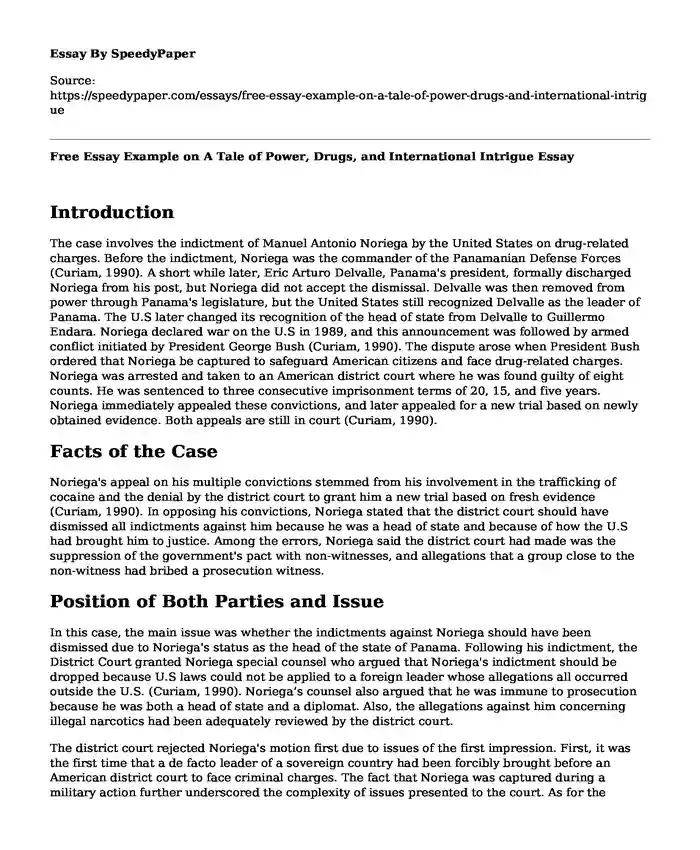
| Type of paper: | Essay |
| Categories: | United States Law Court system Penal system Drug abuse |
| Pages: | 3 |
| Wordcount: | 744 words |
Introduction
The case involves the indictment of Manuel Antonio Noriega by the United States on drug-related charges. Before the indictment, Noriega was the commander of the Panamanian Defense Forces (Curiam, 1990). A short while later, Eric Arturo Delvalle, Panama's president, formally discharged Noriega from his post, but Noriega did not accept the dismissal. Delvalle was then removed from power through Panama's legislature, but the United States still recognized Delvalle as the leader of Panama. The U.S later changed its recognition of the head of state from Delvalle to Guillermo Endara. Noriega declared war on the U.S in 1989, and this announcement was followed by armed conflict initiated by President George Bush (Curiam, 1990). The dispute arose when President Bush ordered that Noriega be captured to safeguard American citizens and face drug-related charges. Noriega was arrested and taken to an American district court where he was found guilty of eight counts. He was sentenced to three consecutive imprisonment terms of 20, 15, and five years. Noriega immediately appealed these convictions, and later appealed for a new trial based on newly obtained evidence. Both appeals are still in court (Curiam, 1990).
Facts of the Case
Noriega's appeal on his multiple convictions stemmed from his involvement in the trafficking of cocaine and the denial by the district court to grant him a new trial based on fresh evidence (Curiam, 1990). In opposing his convictions, Noriega stated that the district court should have dismissed all indictments against him because he was a head of state and because of how the U.S had brought him to justice. Among the errors, Noriega said the district court had made was the suppression of the government's pact with non-witnesses, and allegations that a group close to the non-witness had bribed a prosecution witness.
Position of Both Parties and Issue
In this case, the main issue was whether the indictments against Noriega should have been dismissed due to Noriega's status as the head of the state of Panama. Following his indictment, the District Court granted Noriega special counsel who argued that Noriega's indictment should be dropped because U.S laws could not be applied to a foreign leader whose allegations all occurred outside the U.S. (Curiam, 1990). Noriega’s counsel also argued that he was immune to prosecution because he was both a head of state and a diplomat. Also, the allegations against him concerning illegal narcotics had been adequately reviewed by the district court.
The district court rejected Noriega's motion first due to issues of the first impression. First, it was the first time that a de facto leader of a sovereign country had been forcibly brought before an American district court to face criminal charges. The fact that Noriega was captured during a military action further underscored the complexity of issues presented to the court. As for the district court's jurisdiction over the offense, the court reasoned that Noriega's activities in Panama had effects in the United States; thus, extra-judicial jurisdiction was appropriate as a matter of international law (Curiam, 1990).
Reasoning and Conclusion of the District Court
The district court rejected Noriega's motion that the indictments against him should have been dropped due to his status as head of state and how he was brought to justice by the United States government. The main reason for the rejection of his motion is because Noriega was denied head-of-state immunity by the court (Curiam, 1990). The district court also rejected Noriega’s motion that he was entitled to a new trial because he had discovered fresh evidence of the United States’ suppression of a pact with a non-witness and the allegation that a group close to the non-witness had bribed a prosecution witness.
Conclusion
Under the Geneva Convention III, Noriega is considered a prisoner of war. Therefore, he is entitled to the full range of rights under this treaty, and this treaty is fully incorporated in the United States justice law system. So long as he is reaping the full benefits of the Convention, Noriega can serve his sentence in a civilian prison designated by the Attorney General or the Bureau of Prisons. Whether these parties can provide Noriega with these rights in a maximum-security penitentiary setting is a question of who will determine his place and type of confinement. Those in charge of this responsibility must make sure they follow the guidelines of the Geneva III Convention.
Reference
Curiam: P. (1990, November 10). U.S. v. Noriega. Retrieved August 21, 2020, from https://casetext.com/case/us-v-noriega-20.
Cite this page
Free Essay Example on A Tale of Power, Drugs, and International Intrigue. (2023, Nov 10). Retrieved from https://speedypaper.net/essays/free-essay-example-on-a-tale-of-power-drugs-and-international-intrigue
Request Removal
If you are the original author of this essay and no longer wish to have it published on the SpeedyPaper website, please click below to request its removal:
- Essay Sample on Abusing Children Cases
- Free Essay on Significance of Mandatory Military Service
- Anti-Bullying Essay Sample for Free Use
- Won't You Be My Neighbor: An Analysis of Fred Rodgers' Philosophy of Education and TV Show
- Essay Sample on Health Effects of Child Abuse
- Essay Example: Questioning Straightforward Corporeality and Penetration
- Free Paper Example on Cyber Grooming
Popular categories




